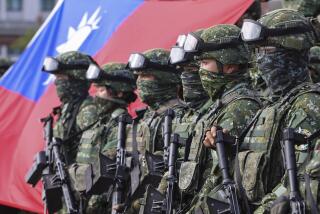China and Taiwan Agree to Nonstop Holiday Flights
- Share via
BEIJING — Longtime rivals China and Taiwan agreed Saturday to allow nonstop charter flights between them over the upcoming Chinese New Year holiday.
The arrangement marks the first time in more than five decades that a commercial aircraft from the mainland would be officially allowed to touch down on Taiwanese soil.
Under the deal negotiated in the Chinese territory of Macao, six airlines from each side would transport Taiwanese people working in China to and from the island during the busiest holiday season.
“In a very short time, in a cordial atmosphere, we have come to an agreement,” Pu Zhaozhou, executive director of China’s Civil Aviation Assn., told reporters after the talks.
Taiwan has banned direct air and shipping links to mainland China since the Nationalists fled to the island in 1949 after losing a civil war to their Communist foes. Beijing considers it a renegade province.
However, since China opened its door to the outside world in the 1980s, Taiwanese in search of business opportunities and ancestral roots have flocked to the mainland and contributed an estimated $100 billion to the Chinese economy.
As many as 1 million Taiwanese now live and work on the mainland. An estimated 300,000 of them are expected to return to the island for the spring festival, which this year will begin Feb. 9.
In the past, they have had to change planes in a third territory, typically Hong Kong or Macao, to cross the strait that separates Taiwan from the mainland. The journey is time-consuming and expensive.
Despite the profitable business relationship, political tensions remain high. The island just reelected a pro-independence president to a second term. China threatens to take Taiwan back by force if Chen Shui-bian’s government declares statehood.
The direct flights are seen as a positive step.
“Taiwan wants to show they are capable of maintaining peace and negotiating a deal with China,” said Chao Chien-min, a politics professor at National Chengchi University in Taipei. “Beijing wants to present a goodwill gesture to the United States, the rest of the world and especially the people of Taiwan, that it’s not always in a confrontational mode.”
Analysts say, however, that the flights are unlikely to lead to broader detente, such as the renewal of regular, direct air and sea links.
“It could help ease cross-strait tensions, but it doesn’t mean a real breakthrough,” said Li Jiachuan, a retired Taiwan affairs expert in Beijing.
“The political stalemate remains as long as Taiwan refuses to recognize that there is only one China.”
Two years ago, a similar attempt was made to allow direct flights during the Chinese New Year holiday. But Taipei would not allow Chinese carriers to join in and insisted that the charter flights stop in a third territory.
This time the flights, slated from Jan. 29 to Feb. 20, still must pass through Hong Kong airspace rather than going directly across the 100-mile strait. But they are not required to stop in Hong Kong.
“The outcome is imperfect, but acceptable,” said Joseph Wu, chairman of Taiwan’s Mainland Affairs Council.
The flights will shuttle between Shanghai, Beijing and Guangzhou in China and Taipei and Kaohsiung in Taiwan.
Regarding concerns about Chinese aircraft flying into Taiwanese territory, Hu Cheng-fu, the island’s vice minister of national defense, said Taiwan’s military was capable of handling security issues related to the charter flights’ operation, suggesting that troops would be deployed at Taiwan’s two airports.
In Saturday’s negotiation, both sides vowed not to use civil aircraft for “uncivil” purposes.
Special correspondent Tsai Ting-I in Taipei contributed to this report.
More to Read
Sign up for Essential California
The most important California stories and recommendations in your inbox every morning.
You may occasionally receive promotional content from the Los Angeles Times.













